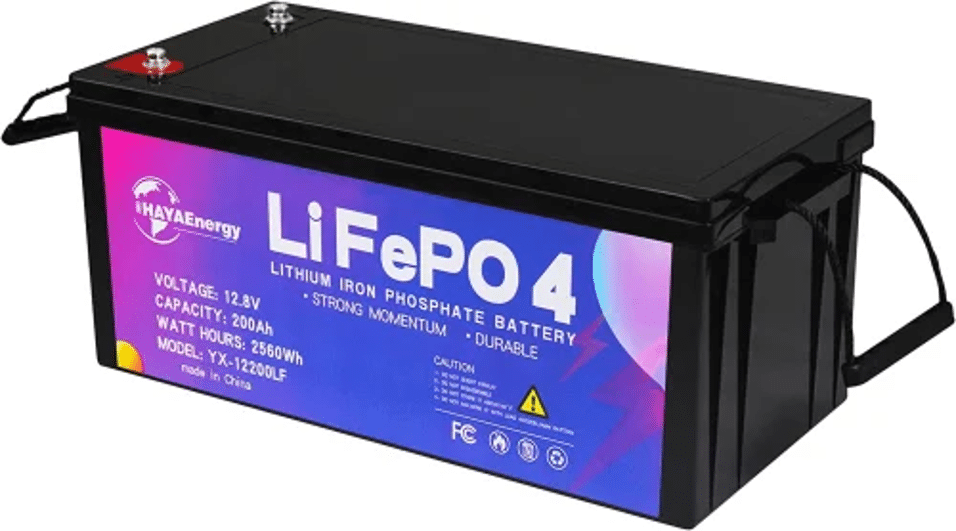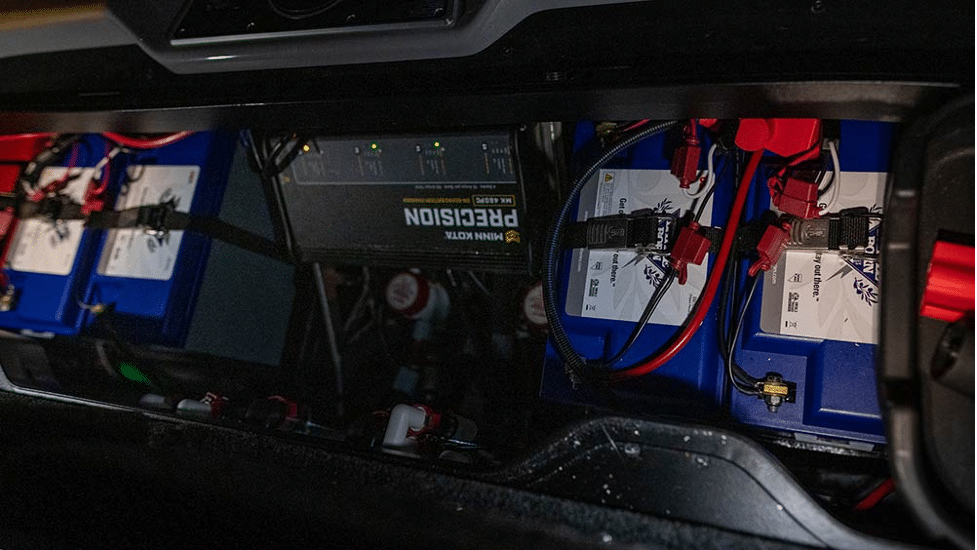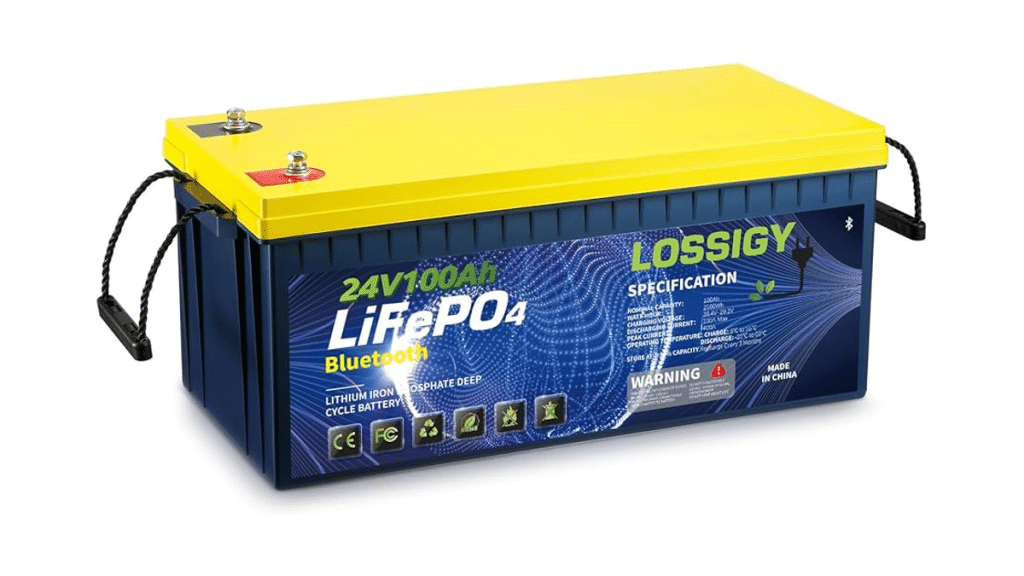Choosing the right battery for your trolling motor is crucial for a successful and enjoyable boating experience. The two main options, a 24-volt battery and a 12-volt battery, each offer unique benefits and limitations. In this article, we’ll explore the key differences between these battery types and help you make an informed decision.
Understanding Battery Voltage: 24 Volt vs. 12 Volt
Battery voltage is an essential factor in determining your trolling motor’s performance. Here’s a breakdown of how voltage affects power, efficiency, and usage:
1. Power Output:
- 24-Volt Battery: Typically offers more power than a 12-volt battery, which means faster speeds and better performance in tough conditions.
- 12-Volt Battery: Adequate for smaller boats or less demanding conditions.
2. Efficiency:
- 24-Volt Battery: More efficient in energy use, leading to a longer runtime. This efficiency is due to the system needing less current for the same power output compared to a 12-volt system.
- 12-Volt Battery: While less efficient, it is often sufficient for short fishing trips or occasional use.
3. Overall Usage:
- 24-Volt Battery: Ideal for frequent boaters who need constant power over longer trips. They are commonly used for larger boats and more powerful trolling motors.
- 12-Volt Battery: Best suited for casual boaters, beginners, or those with smaller boats where space and weight are considerations.
For a deeper understanding of battery voltages and how they impact trolling motor performance, visit Minn Kota.
With these basics in mind, you can start to see which type of battery might be the best fit for your boating needs. The next sections will delve into the specific advantages of each battery type to help further this decision.
Advantages of a 24 Volt Battery for Trolling Motors
When considering a trolling motor battery, the 24 volt battery offers several noteworthy benefits. Here are the key advantages:
- Prolonged Runtime: A 24-volt deep cycle marine battery holds more energy, which allows for extended use. This means fewer interruptions and more time enjoying your fishing or boating trip.
- Higher Power Output: These batteries provide more power to your trolling motor, which can be particularly beneficial in strong currents or windy conditions. You’ll experience better thrust and smoother operation.
- Efficient Energy Use: A 24-volt battery generally offers more efficient energy use compared to a 12-volt battery. This translates to better performance and longer battery life.
- Ideal for Larger Boats: If you have a larger boat, a 24-volt trolling motor battery is often a better choice. Larger boats need more power to navigate effectively, and a 24-volt system can provide that extra boost.
- Reduced Heat Generation: Higher voltage systems, like those using 24-volt batteries, tend to generate less heat during operation. This can improve the overall lifespan of both the battery and the trolling motor.
Benefits of a 12 Volt Battery for Trolling Motors

While a 24-volt battery has its advantages, there are also several benefits to using a 12-volt battery for your trolling motor:
- Flexibility and Availability: 12-volt batteries are more common and easier to find. This makes them a convenient choice, especially if you need to replace your battery quickly.
- Easier Installation: Installing a single 12-volt battery is simpler and quicker than setting up a 24-volt system, which often requires wiring two 12-volt batteries in series.
- Suitable for Smaller Boats: If you have a small to medium-sized boat, a 12-volt trolling motor battery might be sufficient for your needs. Smaller boats usually require less power, making a 12-volt battery a practical option.
- Lighter Weight: Generally, a 12-volt battery will weigh less than a 24-volt battery setup. This can be beneficial if you want to reduce the overall weight on your boat for better speed and fuel efficiency.
By understanding the benefits of both 24-volt and 12-volt batteries, you can make a more informed decision for your trolling motor needs.
Comparing 24v Deep Cycle Marine Battery to 12v Deep Cycle Battery

When deciding between a 24-volt deep cycle marine battery and a 12-volt deep cycle battery for your trolling motor, it’s essential to understand their differences. This comparison will help you choose the right battery based on your specific needs.
Power and Performance
- 24v Deep Cycle Marine Battery: This battery provides higher power and efficiency, which means better performance for trolling motors. It can handle longer trips and heavier loads.
- 12v Deep Cycle Battery: While it offers good performance, its power output and efficiency are generally lower than that of a 24-volt battery.
Runtime and Longevity
- 24v Deep Cycle Marine Battery: Offers extended runtime, allowing you to use your trolling motor for longer periods. This battery typically lasts longer and requires fewer charging cycles.
- 12v Deep Cycle Battery: Provides decent runtime but may need more frequent recharging. Its lifespan can be shorter compared to a 24-volt battery due to higher usage demands.
Usage Scenarios
- 24v Deep Cycle Marine Battery: Ideal for larger boats and serious anglers who spend more time on the water. It suits high-power trolling motors and can handle more demanding conditions.
- 12v Deep Cycle Battery: Suitable for smaller boats and casual fishers. It’s perfect for moderate to light use and those on a budget.
For a more detailed comparison, you can refer to this analysis.
Lithium vs. Traditional Marine Batteries
Choosing between lithium batteries and traditional lead-acid marine batteries depends on your priorities, including weight, lifespan, and cost.
Weight and Portability
- Lithium Batteries: Known for being lightweight. They significantly reduce the weight on your boat, enhancing overall performance.
- Traditional Lead-Acid Batteries: Heavier in comparison, which might impact your boat’s speed and fuel efficiency.
Lifespan and Durability
- Lithium Batteries: Have a longer lifespan and can endure more charge cycles. They are generally more durable and require less maintenance.
- Traditional Lead-Acid Batteries: Have a shorter lifespan and may not handle as many charge cycles. These batteries can require regular maintenance to keep them in good condition.
Cost Efficiency
- Lithium Batteries: While more expensive upfront, they can be more cost-effective in the long run due to their longer life and better performance.
- Traditional Lead-Acid Batteries: Cheaper to purchase initially but may incur higher costs over time due to replacements and maintenance.
Key Benefits
Lithium Batteries:
- Lightweight, improving boat performance
- Longer lifespan and higher number of charge cycles
- Less maintenance required
- Faster charging times
Traditional Lead-Acid Batteries:
- Lower upfront cost
- Widely available and easy to replace
- Proven technology with decades of use
Conclusion
Both battery types have their benefits. If you prioritize weight, longevity, and high performance, a lithium battery might be the right choice. On the other hand, if upfront cost and availability are more important to you, a traditional lead-acid battery could be more suitable.
Practical Considerations: Cost, Weight, and Installation
When selecting between a 24-volt and a 12-volt battery for your trolling motor, practical considerations like cost, weight, and installation are crucial. Here’s a breakdown to help you make an informed choice.
Cost
- 24 Volt Batteries: Generally, these are more expensive upfront compared to 12-volt options. However, they often provide longer runtime, potentially offering better value over time and making excellent marine and trolling motor batteries.
- 12 Volt Batteries: These tend to be more affordable initially, making them a favored choice for budget-conscious buyers. If you’re on a budget, a 12-volt battery can be a cost-effective option.
Weight
- 24 Volt Batteries: Tend to be heavier as they often require fewer, but larger, units. This extra weight can impact your boat’s performance, especially smaller boats.
- 12 Volt Batteries: Typically lighter and more manageable, these batteries are convenient for smaller boats or those with less storage space.
Installation
- 24 Volt Batteries: Installation can be slightly more complex due to the need for a proper connection to utilize the 24 volts. Plus, you might need specialized equipment to handle the higher voltage.
- 12 Volt Batteries: Simpler to install and easier to maintain, making them user-friendly for most boat owners.
By considering these factors, you can determine which battery type aligns best with your specific needs.
Real-Life Scenarios and Case Studies
Understanding how other boat owners use their batteries can provide valuable insights. Here are a few real-life examples:
Example 1: Small Fishing Boat
- Battery Used: 12 Volt
- Reason: The boat owner values the flexibility and ease of handling lighter 12-volt batteries. The batteries are sufficient for short, frequent fishing trips.
- Outcome: The 12-volt battery provides adequate power without adding excessive weight to the boat.
Example 2: Larger Offshore Boat
- Battery Used: 24 Volt
- Reason: This setup is ideal for longer trips requiring a longer runtime and more power. The boat owner was willing to invest more upfront for better performance.
- Outcome: The 24-volt battery delivers the extended runtime needed for full-day excursions.
Example 3: Recreational Pontoon Boat
- Battery Used: 24 Volt Lithium
- Reason: The owner needed a lightweight yet powerful solution for all-day use, making a lithium battery the best fit.
- Outcome: The 24-volt lithium battery provides a combination of power and reduced weight, enhancing the boat’s overall performance.
These sections provide you with comprehensive insights on practical considerations and real-life applications, making it easier to decide between a 24-volt and a 12-volt battery for your trolling motor. Consider your specific needs and circumstances to find the best fit for your boating adventures.
